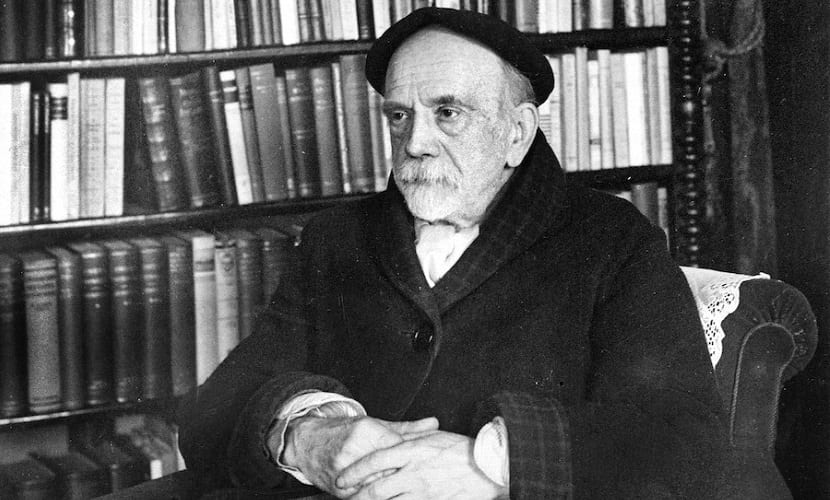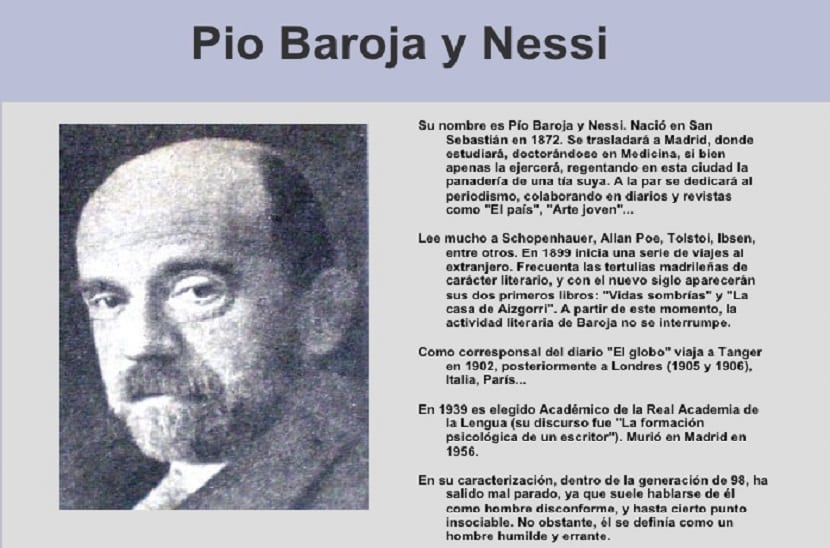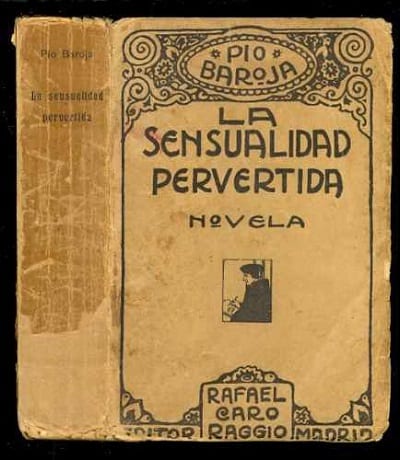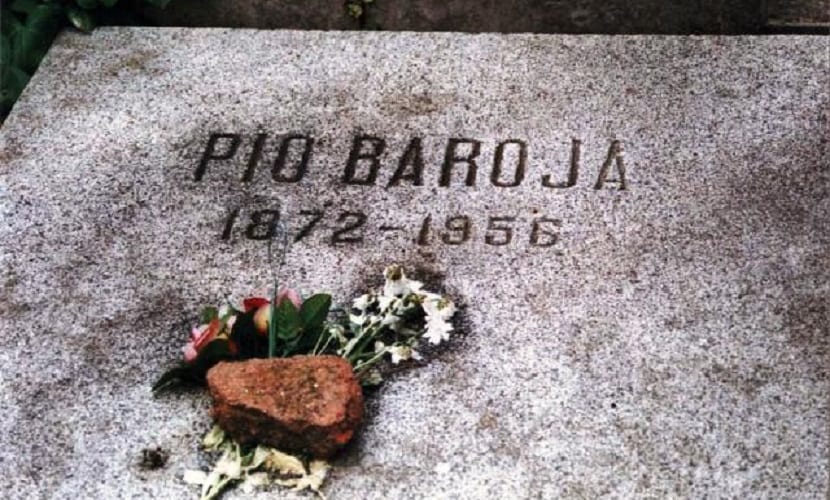
Pio Baroja was born in San Sebastián in 1872 y died in Madrid in 1956. His full name was Pío Baroja and Nessi (He had one of those hardly forgettable names).
I study medicine in Madrid and Valencia, something that had little or nothing to do with literature and called his doctoral thesis "Pain, psychophysical study". Some of his works prior to literature were as a baker with his brother in a family bakery and 2 years as a doctor in Guipúzcoa.
His first friend related to the literary world was AzorinSince starting this friendship, he dedicates his time entirely to writing and literature in general.
The fact that he was a great traveler gave him a fairly open perspective on his hobby and work in literature. He visited numerous cities in both Spain and Europe, Paris being one of the most visited places by the Spanish writer. With the start of the Civil War, Pío Baroja decides to pack his bags and put heading to france from where he returned in 1940.
Those who knew him said that the Basque writer had a quite introvert. He was shy and also somewhat solitary, perhaps the reason why no official love was known to him.
Literature of the generation of '98

It was quite a prolific writeras he wrote a whopping more than 60 novels (some trilogies) and many stories. He wrote on all kinds of topics: from essays, biographies, poetry, theater, narrative and even memoir books.
If we go even further into his literature, we can divide his literary career into 3 different stages:
- First stage: Covers from 1900 to 1914. During these 14 years, Baroja wrote the most representative novels of the generation of 98. Some of his trilogies were "Basque land", composed of the novels "The house of Aizgorri", "El mayorazgo de Labraz" y "Zalacaín the adventurer"; another trilogy was "The fantastic life" where we find the texts "Adventures, inventions and mystifications of Silvestre Paradox", "Path of perfection" y "Paradox, king"; another more titled "The struggle for life" which incorporates one of Baroja's most famous novels, "The search" along with the "Bad weed" y "Red Aurora". The last of his trilogies from this early period was "The race" composed "The Tree of Knowledge", "The Wandering Lady" y "The city of fog". Other well-known works that we can include at this stage were "Caesar or nothing", "The concerns of Shanti Andía" y "The world is there".
- Second stage: Corresponds to the years y entre 1914 1936. In this second phase we can find the book entitled "The perverted sensuality" and three of the four novels grouped under the title of "The sea", what were, "The labyrinth of the sirens", "The pilots of height" y "Captain Chimista's star". In this second stage we can find above all historical works as is the case with the collection of 22 novels known as "The Memoirs of a Man of Action" written between 1913 and 1935.
- Third stage: From 1936, Baroja suffers a certain literary decline and he only dedicates his writing to his memoirs, which occupied in total 7 volumes known as "Since the last lap", written from 1944 to 1949.
Characteristics of the work of Pío Baroja

Of Pío Baroja we can say that these characteristics generally occur in almost all his works:
- Fluency for character creation.
- Good staging and situation of the characters in each development of the works.
- Common element in almost all his works: the maladjustment of their characters. They are almost always nonconformists who fight and rebel for what they have had to live, for a change in society, etc. They are characters "tired of living" and without hope.
- He reveals in his literature the reality of the time (This point is common to all the writers of the generation of 98).
- His literature was composed of short sentences, simple vocabulary, without too many ornaments, ...
- Their novels they were too much realistic and very objective. Even so, its narration was quite open and fragmentary, achieved above all by the dialogues of its protagonists.
- In his works we can find adventures, anecdotes, philosophical themes and also psychological.
Some of his literary texts
Below you can read a short fragment of his work "Youth, egotism", published in 1917:
“In my books, as in almost all modern books, there is a mist of rancor against life and against society ...
The former has always been the commonplace of philosophers. Life is absurd, life is hard to digest, life is like a disease, most philosophers have said.
I am convinced that life is neither good nor bad, it is like Nature: necessary. The same society is neither good nor bad. It is bad for the man who is oversensitive to his time; it is good for those who are in harmony with the environment.
A black man can go naked through the jungle where each drop of water is impregnated with millions of malarial germs, where there are insects whose bite raises abscesses and where the temperature rises to more than fifty degrees in the shade.
A European, accustomed to the protected life of the city, before a nature like the tropical one, without means of defense, would die.
Man must have the sensitivity he needs for his time and for his environment; if you have less, you will live as a minor; if he has the necessary, he will live like a grown man; if he has more, he will be sick ”.
Phrases and famous quotes by Pío Baroja

Next, you can read phrases and quotes that Pío Baroja said, who had no hair on his tongue when it came to speaking clearly and sentencing (I praise him):
- "Only fools have many friends. The greatest number of friends marks the maximum degree on the dynamometer of stupidity ”.
- “The truth cannot be overstated. In truth there can be no nuances. In the semi-truth or in the lie, many ”.
- Clarity in science is necessary; but in literature, no. Seeing clearly is philosophy. Seeing clearly in the mystery is literature. That's what Shakespeare, Cervantes, Dickens, Dostoiewski did… ”.
- "Psychoanalysis is the cubism of medicine."
- "I believe that people, when they are intelligent and completely normal, should not pretend to be strange and strange, because they arrive at invented absurdity."
- “If you ever discover any law, be cautious and do not try to apply it. He has discovered the law… it is enough. Because if this law is physical and you try to apply it to a machine, you will stumble upon raw matter; and if it is a social law, it will run into the brutality of men ”.
- “Really, I don't know if with justice or not, I don't admire ingenuity, because you can see that there are many ingenious men in the world. Nor does it surprise me that there are people with memory, no matter how great and portentous, or that there are calculators; What amazes me the most is the goodness, and I say this without the least bit of hypocrisy ”.
- “Literature cannot reflect everything black in life. The main reason is that literature chooses and life does not ”.
- “The world, for us, is representation, as Schopenhauer used to say; it is not an absolute reality, but a reflection of essential ideas ”.
- "When you get old, you like to reread more than to read."
in 1872 - 1956